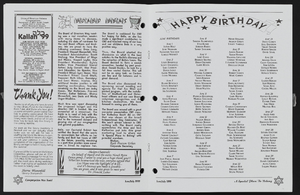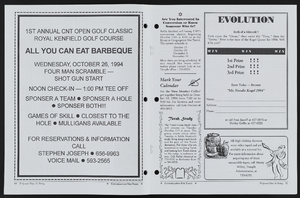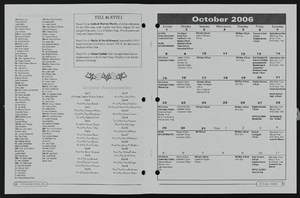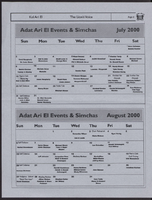Search the Special Collections and Archives Portal
Search Results
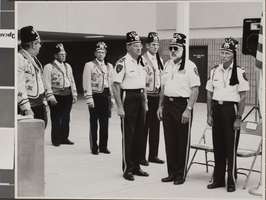
Photograph of dedication/cornerstone ceremony, University of Nevada, Las Vegas, October 07, 1984
Date
Archival Collection
Description
Color guard group Legion of Honor, Zelzah Shrine Temple, at the dedication ceremony of Frank and Estella Beam Hall at the University of Nevada, Las Vegas (UNLV).
Image

Gavrin, David
David Gavrin, a former teacher, has been an on and off resident of Las Vegas since 1974 until he moved permanently to the town in 2003. He and his wife, Rosa, a former CPA, were from New York and were members of Temple Beth Sholom in Roslyn New York. When they moved to Las Vegas they purchased a house near Midbar Kodesh Temple and have been active members ever since with David serving as the Men's Club President.
Person
Schafer, Jared E., 1942-
Jared Shafer is a former board member of Temple Beth Sholom in Las Vegas, Nevada. He served as president of the congregation from 1984 to 1986 and also managed the temple's preschool. He moved to Las Vegas in 1944.
Roundtable Interview with Members of Temple Beth Sholom, 2015 January 14. OH-02459. Transcript. Oral History Research Center, Special Collections, University Libraries, University of Nevada, Las Vegas. Las Vegas, Nevada.
Person

Dorothy Eisenberg interview, March 8, 2017: transcript
Date
Archival Collection
Description
Multicultural advancements in Las Vegas cannot be mentioned without speaking on the monumental contributions of Dorothy Eisenberg. From 1971 to 1998, she was involved with over 25 local organizations and committees and had the honor of having an elementary school named after her. Eisenberg’s beginnings start in the midst of the all American melting pot experience though immigration. Her mother came to the United States from Russia at age twelve and her father from Austria at age sixteen to go upholstery school. Upon marriage, they settled down in Philadelphia after the World War II. They raised Dorothy and her siblings to contribute to the community despite the anti-Semitism that was displayed there on a regular basis. Signs that said, “No dogs and Jews allowed” were common place. After her first husband died, leaving her as a single mother of four little girls, she didn’t allow herself to be trampled by her circumstances by enrolling in Temple University to be a teacher at a time when the university had stigma towards older students. Upon her marriage to her second husband, the family moved to Las Vegas where she found a spiritual home for her family at Temple Beth Sholom, where her children went learned to deeply appreciate their Jewish heritage and attended Hebrew school. Having always been involved with politics in Philadelphia, she faced personal discrimination due to her religion when she was searching for organizations to involve her time. She eventually found a home with the League of Women Voters in 1965 and became involved with the Observers Corp and became aware of what was going on with the African American community from community based research and dialogue. She played a key role as president of the organization and faced heat for her involvement in the desegregation of sixth grade centers with the Kelly vs. Guinn decision in 1972 and was involved with the Welfare Rights Movement. She met Ruby Duncan and Jane Fonda, and she even showed up to the march with her daughters. Eisenberg was heavily involved with her namesake school through meetings with principals at least once a year, reading to students in the classroom, and bringing latkes to the school on Hanukkah. She continues the intergenerational legacy of educational involvement set forth by her parents with supporting her children, grandchildren and great grandchildren in the school as well. Dorothy Eisenberg is a true role model for Nevada and a pioneer for equal education in Las Vegas.
Text

